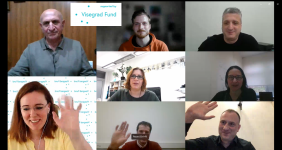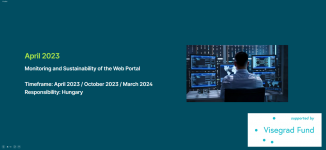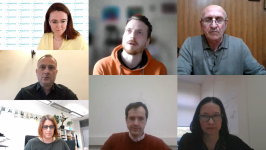Meeting Minutes - Monitoring and Sustainability Workshop I.
Date: 11/04/2023
Present:
- Andrea Corejová SK
- Ewa Nocun PL
- Eva Kostikov CZ
- Temur Maisuradze EEU
- Irakli Tusiashvili EEU
- Mikheil Chelidze Georgian Small and Medium Enterprises Association
- Attila Skopál HUN
- András Lázók HUN
Agenda:
- Status check of the Laboratory and Web Portal, based on project plan
- Research activity suggestions
- Assessment indicators discussion: financial, nonfinancial, international jury, frequency, etc.
- Expert selection for our further workshops in Visegrad project and beyond (traditional conference, competition or meetup of aligned experts and parties related to the Laboratory)
- Sustainability: definition and concept, plan and cost management (sponsors, grants, further projects), best practice sharing
Link of the recording: Monitoring and Sustainability workshop _1-20230411_160526-Értekezletről készült felvétel.mp4
- Status check of the Laboratory and Web Portal based on the project plan
The laboratory's technical supplies are complete, and a list will be distributed [Irakli] to all partners. The main building of the laboratory is still undergoing renovation. Temporarily, there is a special room set up for the laboratory. Very soon, it will be relocated to the final place.
The working version of the web portal is up, and more features are being added. The portal was currently unreachable at the time of the meeting because of some technical issues, which will be solved as soon as possible. According to the project plan, the portal has to be finished by March 2024. The web portal will consist of different articles, and a chatbot will also be operating. Czech Republic is responsible for the chatbot, and several PhD students and two experts are already working on it. Firstly, questions have to be collected on the topics (problems for Georgian SMEs) that Irakli sent. The deadline for this task is June. Partners are asked to suggest problems and topics.
The web portal will be helpful for all visitors (SMEs) who seek answers through professional articles, contact with advisors, and the chatbot. Check expert will join the next meeting and talk about the details.
Poland [Ewa] suggests creating a P.E.S.T. analysis for each country in the project so that startups can access the market more easily. Templates should also be created.
Andrea proposes making the web portal more user-friendly and advises adding forms to the portal where companies can put some information about themselves and the help they need. For example, https://warper.eu/en/home/.
Irakli suggests creating an information bank within the portal that would contain all the works of the registered experts and what they will be doing for the SMEs. This would be a kind of showroom about the project.
Temur adds that the web portal is not just for startups but useful for all types of organizations. As the list of experts there are some already, and the list will continue to grow. Although there are some technical issues with programming the web portal, a first version should be ready by May. Eva [CZ] offers technical help if necessary.
- Research activity suggestions
The activities will start soon. A specially designated room in the University Campus will host the students and experts. Later, after the main building is finished, there will be more space and facilities. Prof. Temur added: to start full operation, it is necessary for the web portal to function properly.
So far, we can make templates and questionnaires. Ewa’s suggestion about how startups can start their businesses in different countries is an excellent idea. The results can be published as well.
Andrea and Eva have the idea of two questionnaires that they will send to the partnership:
• One is for companies around universities, and the questions are oriented about the connections between the participants (communication, services, etc.)
• The other is for startups.
After every partner has provided feedback, and we have finalized the questionnaires, they can be sent out to the relevant companies in all countries. The summary based on their feedback could be a valuable database for publications, a good output for the commission, and even a useful resource for the chatbot.
Andrea has found material about similar research (Georgia’s Emerging Ecosystem For Technology Startups; https://www.adb.org/publications/georgia-ecosystem-technology-startups), but Prof. Temur added that we will make something different.
Mikheil Chelidze, the president of the Georgian Small and Medium Enterprises Association, indicated that his organization could spread the questionnaires among its members via email. He is also open to cooperation by finding experts for the Laboratory, but he needs a list of the types of experts we are seeking. Advertising the web portal will be very easy because we can use television, social media networks, university contacts, etc. The Georgian Small and Medium Enterprises Association can also help by sending messages to its partners and other sector associations.
- Assessment indicators discussion: financial, non-financial, international jury, frequency, etc.
Every partner should suggest a list of KPIs. These will be the basis of the monitoring process, which will take place every six months or yearly. The following indicators were mentioned:
Hungary:
• Checking how many companies have registered on the portal
• Ongoing research processes/month
• How many problems have been solved
Czech Republic:
• Financial KPIs:
o Revenue generated by the web portal
o Web portal marketing and advertising spent
o Customer lifetime value
o Conversion rate of paying customers
o Cost of acquisition
• Non-financial KPIs:
o Web portal traffic by sources (organic search, social media, etc.)
o User engagement metrics (time on site, page/session, etc.)
Slovakia:
• Checking the database
• The number of experts
Poland:
• Checking for languages and responsive design (mobile phones)
Georgia:
• Prof. Temur suggests checking the number of inventions and yearly monitoring.
- Expert selection for our further workshops in Visegrad project and beyond (traditional conference, competition, or meetup of aligned experts and parties related to the Laboratory)
Expert suggestions are connected with the future sustainability of the project. When the project is finished, this will be fundamental for the Laboratory to rise. Therefore, every partner should suggest two experts. Eva (LP) will represent a digital marketing expert, Hungary a user experience designer.
The Czech Republic proposes experts in the fields of financials, banking, commercialization, intellectual property, business models, and market analyses. Technical experts are also useful, such as robotization, etc.
Law, intellectual property, business models, and market analyses are the four most important fields for Poland. It is also momentous to discover the different ways of creating a new startup in each country.
Prof. Temur suggests intellectual property, invention materialization, and marketing.
In summary, "sky is the limit," and several experts from one area can participate in the project, as there may be local conditions in the participating countries that make this necessary.
- Sustainability: definition and concept, plan and cost management (sponsors, grants, further projects), best practice sharing
The partnership needs to work out how the lab can be sustainable. We need solutions for funding the portal and operating it in the long run.
Yet, Hungary does not have any specific ideas on how to support the Laboratory in the future. The funds and opportunities of the European Union should be explored, and of course, any other grants or fundings that can further maintain the project.
The University of Zilina has connections with an advisory company called CIVITTA (https://civitta.com/countries/georgia), and Andrea suggests making contact with them as they have a good view on financial resources.
Ewa from University of Lodz advises finding a business partner who can contribute to running the web portal or organizing a yearly funding event by EEU, which is an opportunity to gather partners and startups to support the Laboratory.
During the meeting, Eva (LP) mentioned that after finishing the current project, EEU can apply for another Visegrad support, which could finance other activities of the Laboratory. Another possibility is Horizon Europe, and ERASMUS+ International Credit Mobility is also an option.
Irakli mentioned that the Estonian embassy in Georgia is willing to support SMEs in all sectors with an open program with no deadlines. They offer mini-grants of up to 15,000 EUR. It may be a good idea to submit our project proposal to them as well.
The discussion on this issue has just begun, and there will be more time to bring in new ideas. For sustainability, an annual gathering conference (traditional, online, or hybrid), and a forum seems to be a good idea.
Two other workshops on the topics of Monitoring and Sustainability will be held, one in October and the other in March 2024.
Hungary has suggestions for the agenda of the next meeting:
- Status report based on assessment indicators:
- The list of indicators needs to be finalized between the two meetings (e.g., August or September).
- If we do so, there will be specific numbers to add to the report.
- List of experts:
- Some of them could be invited to the next workshop to have an insight into the project.
In connection with the first two topics, hopefully, we will be able to have discussions on the research that would be done during this period.
- Sustainability plan that we can carry on to the next meeting in March 2024:
- More specific plans about grants, funding, etc.
Recap from Eva (LP): The next workshop will be held on May 15 for 20 SMEs. Partners have to decide on the topics they would choose. Advertising is an essential task to gather as many Georgian partners, SMEs, and organizations as possible. Irakli will be responsible for advertising the workshop in Georgia. The partnership received topics, including Digitalization, Organization culture, and Operational improvements.
Partners need to suggest speakers for the topics, and as the date approaches, the partnership will choose one representative for each topic. The deadline for proposals is the end of April.
Another important decision-making point is how the event will be organized: it can be live online, or speakers can pre-record their presentation.


